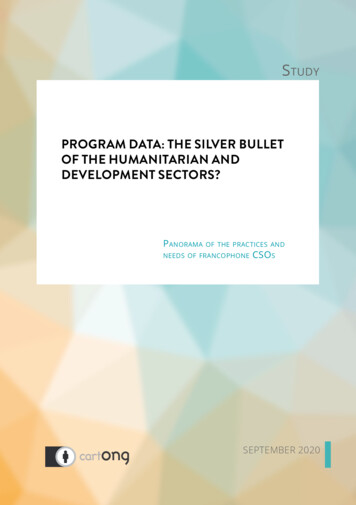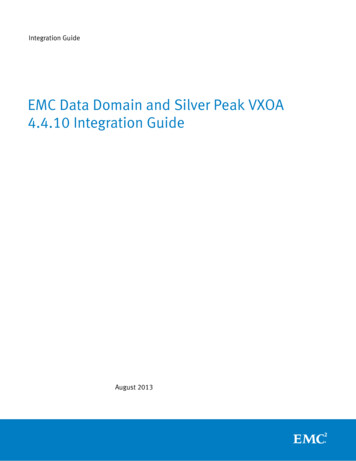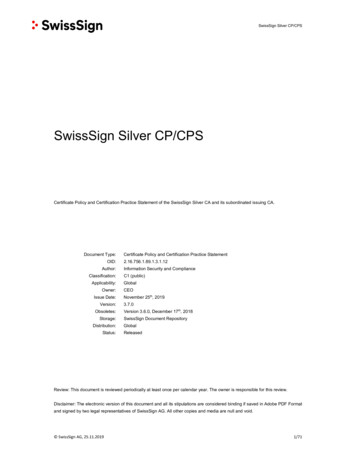
Transcription
StudyPROGRAM DATA: THE SILVER BULLETOF THE HUMANITARIAN ANDDEVELOPMENT SECTORS?Panoramaof the practices andneeds of francophoneCSOsSEPTEMBER 2020
CARTONGCreated in 2006, CartONG is a French H2H/support NGO specialized in InformationManagement. Our goal is to put data at the service of humanitarian, development andsocial action projects. We are dedicated to improving the quality and accountability of fieldactivities, in particular through better needs assessments and monitoring and evaluation.We act as a multidisciplinary resources and expertise center, accompanying our partners’strategies and operations. Our staff and volunteers also support the community as a wholeby producing documentation, building capacities and raising awareness on the technical,strategic and ethical challenges of digital technologies.www.cartong.orgThis study was carried out in the framework of the “Strengthening Information Managementwithin francophone CSOs“ project led by CartONG and co-financed by the French DevelopmentAgency (AFD) over the period 2020-2022. For more information, see the article published onour website: strengthen-informationmanagement-csos or write to: renforcement-osc@cartong.orgAUTHORSThis study was written by the CartONG team - in particular Edmond Wach, Maeve de Franceand Nina-Flore Eissen - and benefited from the methodological advice and shrewd reviewof Lisa Daoud, researcher, trainer and evaluator within the Groupe URD.The study was translated from French to English by Marie Parisot with support from theCartONG team. Template created by https://outil-plume.fr/.ACKNOWLEDGMENTSCartONG thanks the dozen CSOs of the “francophone Information Management Communityof Practice” for the richness of the exchanges around these themes over the last five years.A big thank you to all the respondents of the survey and to the professionals of the humanitarianand development sectors who accepted to be interviewed for this study.This publication is supported by the French Development Agency (AFD). Nevertheless, theideas and opinions presented in this document do not necessarily represent those of the AFD.This study is made available under the terms of the Creative Commons Attribution 4.0International License.Readers are encouraged to use the contents of this study for their own publications, as long asthey duly refer to it when it is mentioned (quotation, excerpt, name of publication, etc.). For onlineuse, we request that the link of the publication on the CartONG website or blog be used.Icons credits: by Freepik, ²surang and Those Icons available on www.flaticon.com and by Alena,Gonzola Bravo, Grafix Point, IcoMoon, Jessica Lock, Justin Blake, kiddo, Libby Ventura, Made xMade, Markus, Nhor, Pablo Rozenberg, priyanka, ProSymbols, shashank singh, Suresh Savani andSusannanova available at www.thenounproject.com
TABLE OF CONTENTSACRONYMS6EXECUTIVE SUMMARY 7RATIONALE81. METHODOLOGY91.1 SCOPE OF THE STUDY1.2 SOURCES OF THE INFORMATION USED 1.3 METHODOLOGICAL LIMITATIONS 2. HOW CAN WE DEFINE PROGRAM DATA MANAGEMENT? 9911132.1 HISTORIC ORIGIN OF THE TERM 132.2 A “PORTMANTEAU” WORD LEADING TO A LACK OF OWNERSHIPOF THE CONCEPT 142.3 A FIRST DEFINITION 2.4 TRANSVERSALITY AND DISTINCTION FROM OTHER TERMS 3. DOES DATA MANAGEMENT REALLY SERVE PROJECTQUALITY?1518233.1 DATA MANAGEMENT AS, FIRST AND FOREMOST, A TOKEN OFEFFICIENCY AND EFFECTIVENESS 243.2 DATA MANAGEMENT AT THE SERVICE OF CSO ORIENTATIONS 244. ARE CSOs MATURE ENOUGH IN TERMS OF DATAMANAGEMENT?4.1 CLASSIFICATION OF CSOs IN TERMS OF DATA MANAGEMENT2727
28305. WHAT ARE THE CURRENT AND FUTURE DATA MANAGEMENT 325.1 INSUFFICIENT DATA LITERACY 5.2 FRAGILE AND OFTEN INCONSISTENT STRATEGIES 5.3 A LACK OF LEADERSHIP AND POORLY DEFINEDRESPONSIBILITIES 5.4 AN INADEQUATELY CONTROLLED TECHNOLOGYENVIRONMENT 333538415.5 THE HAID SECTOR IN THE AGE OF INFORMATION OVERLOAD 455.6 ETHICS AND RESPONSIBILITY: THE ‘FORGOTTEN ONES’ OFDATA MANAGEMENT 5.7 OTHER RELATED STAKES 5.7.1 MANIPULATION AND POWER GAMES AROUND DATA 5.7.2 OPEN DATA 5.7.3 TECHNOLOGICAL SUSTAINABILITY AND LOW TECH 5.7.4 RISK OF DEHUMANISATION OF HAID ACTIVITIES 5.7.5 DIGITAL DIVIDE AND EXCLUSION 5.7.6 RELATIONS WITH THE PRIVATE SECTOR 6. WHAT DIFFERENCES IN APPROACH EXIST BETWEENCSOs?6.1 HUMANITARIAN CSOs VS. DEVELOPMENT CSOs6.2 DIFFERENCES LINKED TO THE SECTOR OF INTERVENTION6.3 A QUESTION OF SIZE6.4 ANGLOPHONE VS FRANCOPHONE SPHERE OF INFLUENCE47505050515253545656575860
7. WHAT TYPE OF SUPPORT AND RESOURCES ARE NEEDEDFOR CSOs?627.1 CONDITIONS OF SUPPORT AND TYPE OF RESOURCESEXPECTED 7.2 PRIORITY THEMES FOR CSO SUPPORT 62648. RECOMMENDATIONS66APPENDICES70
ACRONYMSAFDAgence Française de Développement (French DevelopmentAgency)ALNAPActive Learning Network for Accountability and PerformanceAMPAgence des Micro Projets (Agency for Micro Projects)BIBusiness IntelligenceCRSCatholic Relief ServicesCSOCivil Society OrganisationDFIDDepartment for International DevelopmentDIALDigital Impact AllianceGDPRGeneral Data Protection RegulationGISGeographic Information SystemsHAIDHumanitarian Aid and International Development (SolidaritéInternationale in French)IASCInternational Accounting Standards CommitteeICRCInternational Committee of the Red CrossICT4DInformation and Communications Technologies for DevelopmentIMInformation ManagementIMOInformation Management OfficerM&EMonitoring and EvaluationMDCMobile Data Collection (Collecte de données sur mobile)NGONon-Governmental OrganisationNICTSNew Information and Communications TechnologiesOCHAOffice for the Coordination of Humanitarian AffairsODIOverseas Development InstituteODKOpen Data KitSDCSwiss Agency for Development and CooperationSDGSustainable Development GoalsUSAIDUnited States Agency for International Development6PROGRAM DATA:THE SILVER BULLET OF THE HUMANITARIAN AND DEVELOPMENT SECTORS?
EXECUTIVE SUMMARYProgram data management - alsoknown as Information Management(IM) - is both a topical issue and thesource of numerous debates withinfrancophone Humanitarian Aid andInternational Development (HAID) CivilSociety Organisations (CSOs). Based ona survey of CSOs, a literature reviewand interviews with key stakeholders,this study is intended to feed intosector discussions on the topic.Based on the concept of IM, programdata management is a term whosescope of application continues tofluctuate and whose definition remainsunclear. With a view to facilitating itsownership, readers of this study willbe given an accessible definition based on the data life cycle - and arelatively small scope of application,at the juncture of Monitoring &Evaluation (M&E), Information andCommunications Technologies forDevelopment (ICT4D), informationsystems and knowledge management.Despite studies still being relativelysparse as to the link between projectdata management and project quality,the available evidence shows that gooddata project management makes forgreater efficiency and transparency inorganisations. The evidence gatheredsuggests, however, that project datamanagement is widely used today forthe benefit of bottom-up accountability- towards decision-makers and financialbackers - rather than for day-to-dayproject steering.The reasons for this state of affairsare manifold, but it appears that chiefamongst them is a significant lack ofmaturity from francophone CSOs inmatters relating to data and digitalissues. Six main weaknesses and leversfor action have thus been identified:(i) an insufficient data literacy withinCSOs; (ii) unduly fragile, siloed andinsufficiently funded program datamanagement strategies; (iii) a lackof leadership and often overly vagueresponsibilities; (iv) a technologicalenvironment that is neither controllednor influenced by CSOs; (v) the use ofapproaches that foster informationoverload and neglect qualitative data;and (vi) an under-estimation of theresponsibilities carried by CSOs and ofthe ethical issues at stake with regardto the data they manipulate.Confronted with these challenges, itappears that francophone CSOs aresomewhat lagging behind - at leastin terms of awareness and strategicpositioning - compared to theiranglophone counterparts. Moreover,program data management continuesto be approached by the various CSOsin an inconsistent manner: the studytherefore proposes a classification ofCSOs and reflects on the main existingdifferences - between types, sectorsand sizes - and in particular points outthe difficulties encountered by thesmallest organisations.Finally, this study is an opportunity toidentify both the type and the contentof materials required for program datamanagement by francophone CSOs; itshould also be put-to-use to suggestrecommendations to the variousinternational aid and developmentactors, especially CSOs, who wouldbenefit from being more proactiveon this topic, as well as to donors andnetwork heads who play a pivotal rolein these issues.PROGRAM DATA:THE SILVER BULLET OF THE HUMANITARIAN AND DEVELOPMENT SECTORS?7
RATIONALEMirroring our society, the HumanitarianAid and International Development(HAID) sector is in the throes of adigital revolution. Whilst the latteris undeniably impacting day-today management of Civil SocietyOrganisations (CSOs) - whether intheir administrative duties or inthose related to fundraising - it is alsogenerating radical changes in actionsbeing implemented for the benefit ofpopulations.Although it has become a key elementin the coordination of operations, datamanagement remains somewhatinvisible from the perspective of thesector, in spite of its many ethical,financial and human implications, andabove all its impact on project quality.In the field and at headquarters,project teams are therefore devotingan increasing amount of time to datamanagement, often at the expense ofother activities. Poorly trained and illequipped, these teams can producesubstandard performances withregards to these tasks, and withoutthe topic necessarily being regardedas an operational issue by most CSOs.At present and to our knowledge,no equivalent study with a view toexamining, as a whole, the practicesof (francophone) CSOs, or to identifyingtheir needs in terms of program datamanagement, has yet been carried out.A number of analyses and articles doexist, yet these generally approachthe subject either from a technicalstandpoint or as if these were stillinnovations for the sector and thuswith limited constructive hindsight. Theorganisational dimension is moreoverrelatively unexplored and very littleconsolidated data at the inter-CSOlevel is available. Lastly, although CSOshave been handling large amountsof data for almost 20 years, thereremains much debate: what level ofattention and investment should datamanagement be subject to? Does theactivity require a dedicated person inhouse and, if so, which profile shouldbe given priority? In fact, where doesthe scope of data management beginand where does it end? Do CSOsworking in humanitarian situationshave different needs than thoseworking in a development context?Do differences in approach existbetween francophone and anglophoneCSOs, the latter often deemed moreadvanced in the field?The purpose of this study is thereforeto explore and provide preliminaryanswers to these questions. It thusaims to make a valuable contributionto bolster the debate on datamanagement. We have thereuponsought to synthesise and formaliseoften scattered and at timescontradictory considerations. Byclarifying the various elements feedingthe debate along with the issues atstake, we hope that this documentwill fuel discussions at the level ofCSOs and their stakeholders, includingdonors and networks. In summary,this study should enable specialisedorganisations, including Support CSOs*such as ourselves, to better define theirpriorities.* For more information, see the French Support NGO group or its humanitarian equivalent.8PROGRAM DATA:THE SILVER BULLET OF THE HUMANITARIAN AND DEVELOPMENT SECTORS?
1. METHODOLOGY1.1 Scope of the studyThis study focuses mainly on operational francophone CSOs within the Humanitarian Aidand International Development sector. This scope - which may seem relatively limited - isjustified not only by (i) the determination to remain within a reduced field that is compatiblewith an analysis of sufficient quality, but also by (ii) an observed shortage of available datato date on these organisations and (iii) the willingness to test the often heard hypothesisaccording to which the francophone community is definitely lagging behind - particularlywhen compared to anglophone CSOs - in said data management.THE NAME “FRANCOPHONE HUMANITARIAN AID AND INTERNATIONALDEVELOPMENT CSOS” is understood here as incorporating organisations thatimplement both humanitarian aid operations and international development activities,having their headquarters in a French-speaking country irrespective of their status (NGO,association, foundation or other), size, sector (education, health, agriculture, etc.) ormethod of intervention. However, international organisations and local authorities areexcluded from this group, among others.This analysis focuses on international CSOs with headquarters in Europe, either France,Switzerland or Belgium. So-called “Southern” national or regional CSOs have not beenincluded. The latter are in fact an essential link in the chain of solidarity, and we hope toinclude them into future studies.1.2 Sources of the information usedThis study is based on three data sources that were triangulated during the analysis: anexisting secondary literature review, semi structured interviews and an online quantitativesurvey of CSOs operating in the aid sector.A total of sixty-five documents, identified as relevant, were thus reviewed by the CartONGteams for this study (bibliography available in Appendix 1.3). With less than a quarter ofthese documents being available in French and/or in reference to francophone CSOs, wewere compelled to make extensive use of anglophone studies in our analysis and thereforein the set of arguments set out in this study.As for the semi structured interviews, they were primarily conducted with networks ofCSOs, donors, anglophone CSOs1 and small francophone CSOs (list of interviews availablein Appendix 1.4 and semi structured grid in Appendix 1.5). All in all, eighteen interviewswith twenty-five people were carried out. It should however be noted that some twenty-fiveorganisations - mainly francophone donors and small CSOs - did not respond to our interviewrequests, either because they were unable to identify anyone capable of addressing theissue internally, or because the theme of the study did not seem to carry very high priorityfor them or was too removed from their day-to-day operations.1. One of the main objectives of the interviews conducted with anglophone CSOs was to compare theirapproaches with those of Francophone CSOs, but also to identify lessons learned that could be beneficial to thesector.PROGRAM DATATHE SILVER BULLET OF THE HUMANITARIAN AND DEVELOPMENT SECTORS?9
Figure 1: Methodology of the studyThe survey intended for CSOs (c.f. the form in Appendix 1.7), widely disseminated by CartONGacross francophone HAID networks between January and February 2020, made it possible- after removing out-of-scope respondents - to collect contributions from fifty intervieweescomprised of: Forty-four employees and/or members of thirty-five operational francophone CSOs - fiveorganisations having more than one respondent.Six individuals who responded individually, either anonymously or as data managementspecialists working as consultants or within an organisation that is not a CSO.Brief profile of respondents: respondents are chiefly HAID employees(at close to 95%) and headquarters-based - as such, fewer than 10% ofresponses originated from the field. They are predominantly qualified(nearly three-quarters of them have five years’ experience in HAID and40% over ten years) and more than 20% are in senior management positions.About half hold positions related to program management, while a quarterare in new technology or data management positions and approximately 10%perform duties associated with Monitoring & Evaluation (M&E). Lastly, closeto 50% are women and 40% are men - with the understanding that 10% ofrespondents did not wish to specify.10PROGRAM DATA:THE SILVER BULLET OF THE HUMANITARIAN AND DEVELOPMENT SECTORS?
Of the thirty-five CSOs represented, the majority have their headquarters in France, withonly one CSO based in Belgium and three in Switzerland. The thirty-five CSOs represent awide variety of sectors and areas of intervention. The table below presents CSOs by budgetsize and type of operational context. It should be noted that almost all of the organisationsthat we define as small (with an annual budget of less than 2 million euros) or medium-sized(2 to 10 million euros) work in a development context. Large organisations (over 10 millioneuros) working in a crisis or mixed context (22%) are under-represented in terms of numberof CSOs, but nevertheless represent 38% of respondents.Table 1: CSOs that responded to the survey by annual budget and opertaionalcontextsIt should be noted in closing that the information collected via the three main sources wasaugmented by the knowledge of CartONG’s teams, gained from: (i) projects conducted withvarious partners of the organisation since 2006, (ii) informal interactions in recent monthswith different CSOs, and (iii) discussions and collective work carried out by a dozen CSOswithin the Francophone Information Management Community of Practice, in existence since2015 and led by CartONG - who, inter alia, have contributed to the section on defining thescope of data management.1.3 Methodological limitationsThis study was designed with a limited budget and a relatively short time frame. Owing to itsmethodology, it contains several biases that are our responsibility to clarify here: The relatively limited number of survey respondents has enabled us to index a reasonablenumber of practices, attitudes and perceptions but does not allow the extrapolation ofresults to the whole of the CSO sector. We also consider that the sample of respondentsis made up largely of an informed public. Therefore, the data gathered during the surveyshould be interpreted as trends illustrating the evolution of the sector, without purportingto be exhaustive. Despite having endeavoured to mobilise beyond our usual networks,the data collected during the survey and the interviews is chiefly derived from the Frenchsector and could not be sufficiently triangulated on the Belgian and Swiss sides.Given the profile of respondents and the fact that we’ve had to limit the scope of the study,the data collected allows for only a limited understanding of the perception of personneldirectly present in areas of intervention; whether it be field staff from international CSOsor from national CSOs based in these same areas.PROGRAM DATA:THE SILVER BULLET OF THE HUMANITARIAN AND DEVELOPMENT SECTORS?11
As several sector players failed to accept our requests for interviews, not all informationcould be triangulated for debate and confirmation - particularly on the donors’ side.The scope of data management being more formalised on the humanitarian side thanon the development side (c.f. Section 2), there is a bias on the availability of secondarydata in each type of context. An effect reinforced by the fact that the authors of this study,more accustomed to working in humanitarian contexts, may have had more difficulty inquestioning certain results in a development context.Due to major opposing views on the scope of data management and limited existingliterature on the topic, we have been obliged to include documentary sources coveringa wider scope than originally desired2. We have de facto allowed ourselves to extrapolatethe conclusions of certain documentary sources.To finish, a red flag should be raised, given that a
data project management makes for greater efficiency and transparency in organisations. The evidence gathered suggests, however, that project data management is widely used today for the benefit of bottom-up accountability - towards decision-makers and financial backers - rath











